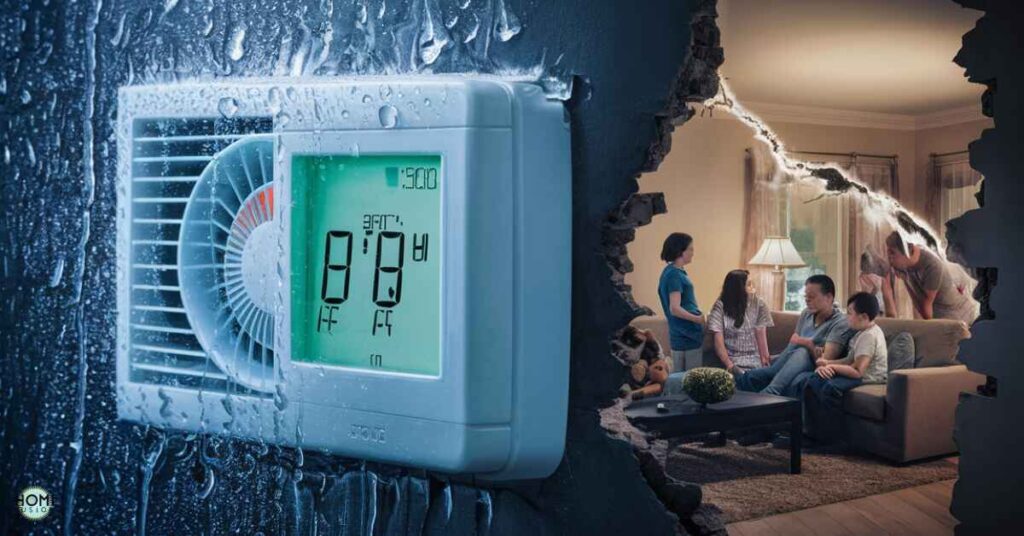Ever wondered why your house feels humid? It is often due to inadequate ventilation in areas like bathrooms and kitchens where moisture accumulates without a way to escape. Another cause can be oversized air conditioning units that cool the air too quickly not allowing enough time for proper dehumidification.
Factors like climate and construction materials also impact indoor humidity. High outdoor humidity in certain regions can transfer moisture indoors while materials like concrete and wood can absorb and release moisture affecting indoor humidity levels.
Understanding these factors can help pinpoint and address the root causes of high humidity in your home.
what causes of high humidity in a house?
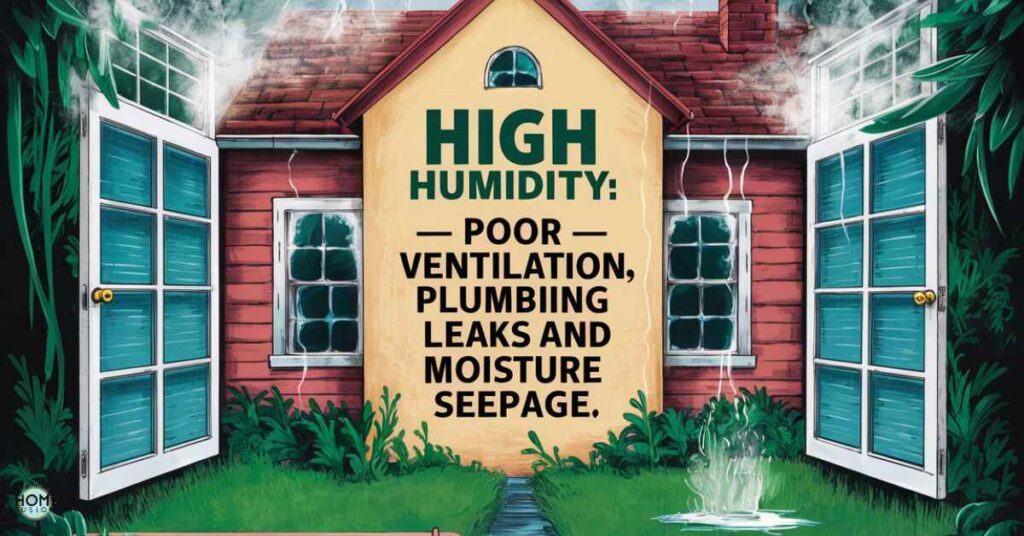
High humidity in a house can be caused by various factors. Inadequate ventilation large air conditioning units and moisture seepage are common culprits of high indoor humidity levels.
Daily Activities
Daily activities such as cooking showering and doing laundry can introduce moisture into the air raising indoor humidity levels. Opening windows during humid weather can also let moisture in. Using a humidifier without monitoring humidity levels can contribute to excessive indoor moisture.
- Taking hot showers or baths
- Cooking with uncovered pots
- Drying clothes indoors
- Using humidifiers excessively
- Watering indoor plants
Your house isn’t keeping outside air outside
If your house is not effectively keeping outside air out it can lead to higher humidity levels indoors. This can happen due to gaps around doors and windows allowing humid outdoor air to seep in. Improving weatherstripping and caulking around openings can help create a tighter seal and reduce indoor humidity.
Poor Ventilation
It especially in bathrooms and kitchens can lead to high indoor humidity levels by trapping moisture indoors. Without adequate airflow moisture from daily activities like showering and cooking accumulates. This can create a warm and sticky environment promoting mold growth and discomfort.
Plumbing Leaks
It can contribute to indoor humidity by introducing moisture into your home. Even minor leaks can gradually increase humidity levels over time. Detecting and repairing leaks promptly can help maintain a healthier indoor environment and prevent potential damage.
Excessively Large Air Conditioner
An excessively large air conditioner can contribute to high indoor humidity levels. When the AC unit is too big for the space it cools the air quickly without adequately removing moisture. This rapid cooling cycle doesn’t allow sufficient time for dehumidification leading to elevated humidity indoors.
Moisture Seepage
It occurs when water enters your home through cracks leaks or inadequate waterproofing. This can lead to elevated humidity levels indoors, especially in areas like basements or crawl spaces. Addressing moisture seepage is important to maintain a comfortable and healthy indoor environment.
How will you know if the thermal envelope is part of your humidity problem?
Determining if the thermal envelope contributes to your humidity issue involves checking for air leaks and inadequate insulation. You might notice fluctuating indoor temperatures or feel drafts around windows and doors. Condensation on windows or walls during certain weather conditions can also indicate issues with the thermal envelope.
Your HVAC system isn’t up to the job
If your HVAC system is inadequate for your home’s size or needs it may struggle to effectively manage humidity levels. An undersized system would not remove enough moisture from the air while an oversized system can cool too quickly without adequately dehumidifying.
Regular maintenance and proper sizing of your HVAC system can help address humidity issues efficiently.
Why High Humidity Is Harmful?
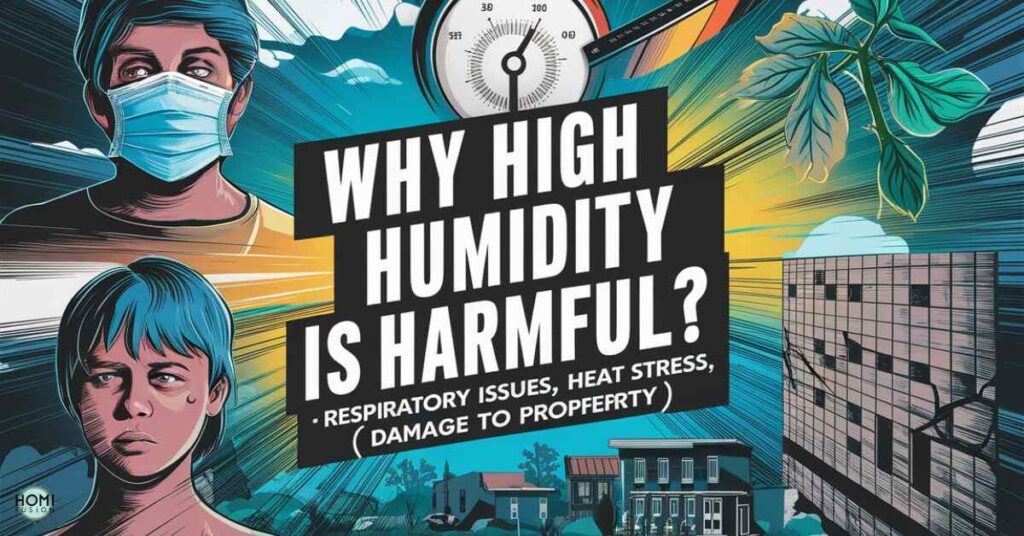
- Respiratory Issues: High humidity levels can make it difficult to breathe, especially for individuals with respiratory conditions like asthma or COPD.
- Heat Stress: Excessive humidity can hinder the body’s ability to cool down, leading to heat-related illnesses like heat exhaustion and heatstroke.
- Mold Growth: High humidity creates a favorable environment for mold and mildew growth, which can cause allergies and respiratory problems.
- Poor Indoor Air Quality: Humid conditions can trap pollutants and allergens in the air, leading to poor indoor air quality and potential health issues.
- Damage to Property: Excessive moisture in the air can cause damage to wooden furniture, electronics, and other sensitive items, leading to costly repairs or replacements.
- Discomfort: High humidity can cause discomfort due to excessive sweating, stickiness, and a general feeling of clamminess.
- Pest Problems: Some pests thrive in humid environments, leading to increased infestations of insects like mosquitoes, dust mites, and cockroaches.
- Sleep Disturbances: Humid conditions can make it challenging to sleep comfortably, leading to disrupted sleep patterns and fatigue.
- Increased Risk of Infections: High humidity can create an environment where bacteria and viruses thrive, increasing the risk of infections and illnesses.
Also take a look at: HOW TO CLEAN FABRIC CAR SEATS AT HOME
How Can You Determine If Your Home Has Excessive Humidity?
You can determine excessive humidity in your home by looking for signs like condensation on windows musty odors or damp walls and floors.

Visible Condensation
Visible condensation occurs when moist air comes into contact with cooler surfaces like windows mirrors or pipes. It appears as water droplets or fog on these surfaces and can be a sign of high indoor humidity levels. Persistent condensation can lead to mold growth and damage to surrounding materials if not addressed.
Peeling Paint
Peeling paint on walls or ceilings can indicate excessive humidity in a home. High moisture levels can cause paint to lose its adhesion and peel away from surfaces. This issue is commonly seen in areas with inadequate ventilation or persistent humidity problems.
Wet Stains
Wet stains on ceilings or walls can be a sign of excessive moisture in your home. These stains may indicate water leaks or condensation issues, especially in areas prone to humidity buildup. It is important to address wet stains promptly to prevent further damage and mold growth.
Dark Spots
Dark spots on walls or ceilings could be an indication of mold growth caused by excessive humidity. Mold thrives in damp environments and can cause health problems. It is crucial to investigate and address dark spots promptly to prevent further damage and potential health risks.
Constant Sweating
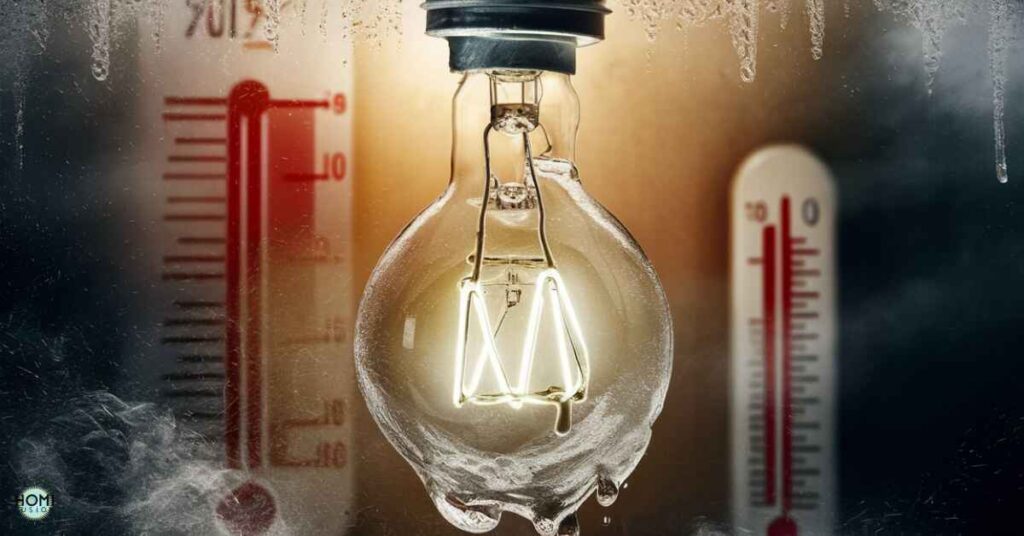
Constant sweating indoors especially when not associated with physical exertion can be a sign of high indoor humidity. This occurs when moisture levels in the air are too high making it difficult for perspiration to evaporate from your skin. High humidity can create a sticky and uncomfortable environment in your home affecting your overall comfort and well-being.
How to Reduce Humidity in Your Home?
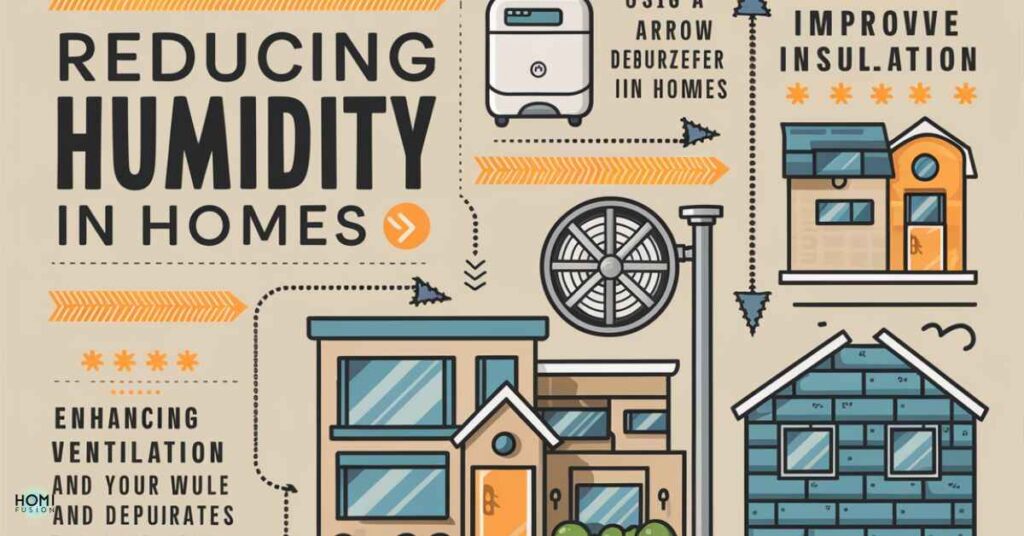
To reduce humidity, use dehumidifiers in damp areas and ensure good ventilation in kitchens and bathrooms. Maintain your AC system and use weatherstripping and caulking around windows and doors to keep outdoor humidity out.
Utilize a Dehumidifier
Using a dehumidifier can help reduce excess moisture in your home. Place it in areas prone to dampness like basements or bathrooms. Ensure the dehumidifier is the right size for the space to effectively control humidity levels.
Enhance Ventilation
Improving ventilation can significantly reduce humidity levels in your home. Use exhaust fans in bathrooms and kitchens to expel moist air. Opening windows and doors when weather permits also helps circulate fresh air and lower humidity.
Weatherstripping
It is a simple and effective way to seal doors and windows. It prevents warm humid air from entering your home. Check and replace weatherstripping regularly to maintain its effectiveness in reducing humidity.
Improve Insulation
It helps regulate indoor humidity by reducing the exchange of outdoor air. Proper insulation prevents warm moist air from entering your home during hot humid weather. It also keeps heated air from escaping during cooler seasons maintaining a more consistent humidity level indoors.
Appropriate Sizing of Air Conditioning
Ensuring the appropriate sizing of your air conditioning system is crucial for humidity control. An oversized AC unit may cool the air too quickly failing to adequately dehumidify it. Conversely, an undersized unit may struggle to maintain comfortable humidity levels. Properly sizing your AC system ensures efficient operation and optimal humidity control.
Get an HVAC system that’s built to handle the humidity
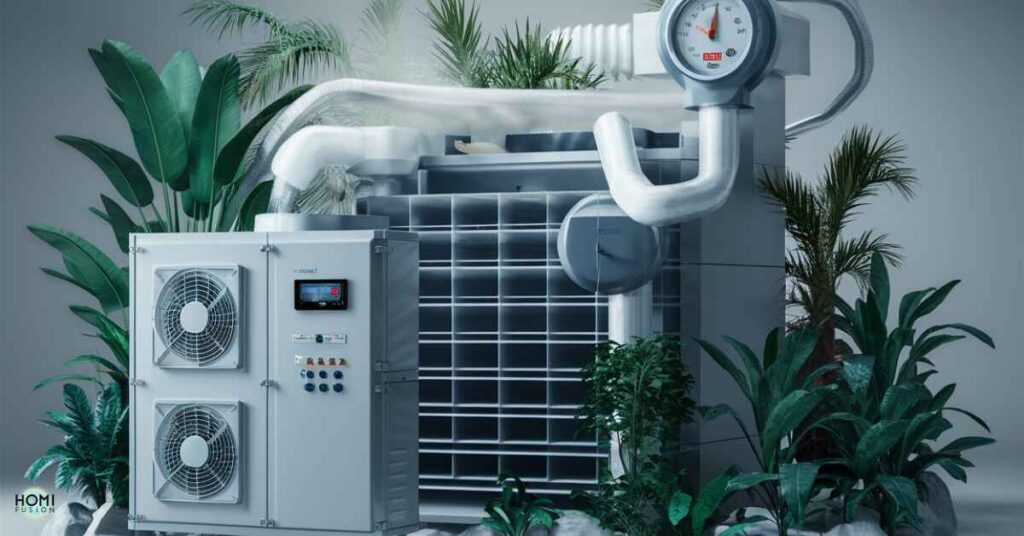
To effectively manage humidity choose an HVAC system designed to handle high moisture levels. Look for models with variable speed settings that can maintain consistent airflow and humidity control. Regularly maintain your HVAC system to ensure it operates efficiently and effectively in managing indoor humidity levels.
The best HVAC system for high humidity? An air-source heat pump
An airm source heat pump is an excellent HVAC choice for managing high humidity levels. It efficiently removes excess moisture while providing both heating and cooling. This system is particularly effective in regions with humid climates, offering consistent humidity control for year-round comfort.
Things You Can Do Outdoors to Deal with Humidity
To address outdoor humidity maintain clear gutters and downspouts for efficient water drainage. This prevents water buildup and potential leaks supporting a more comfortable indoor environment with reduced humidity impact.
- Ensure proper drainage away from your home by sloping gutters and downspouts away from the foundation.
- Keep gutters and downspouts clean to prevent water buildup.
- Consider using Hydroclay or other treatments to seal the foundation and prevent water intrusion.
- Regularly inspect and maintain your roof to prevent leaks and moisture entry.
- Install awnings or sloped ledges above windows and doors to divert water away from openings.
How will you know if your HVAC is part of the humidity problem?
If your HVAC system is struggling to manage humidity it could be due to improper sizing or maintenance issues. An oversized system may cool the air too quickly without adequately dehumidifying it. Conversely, an undersized system may not effectively remove moisture from the air.
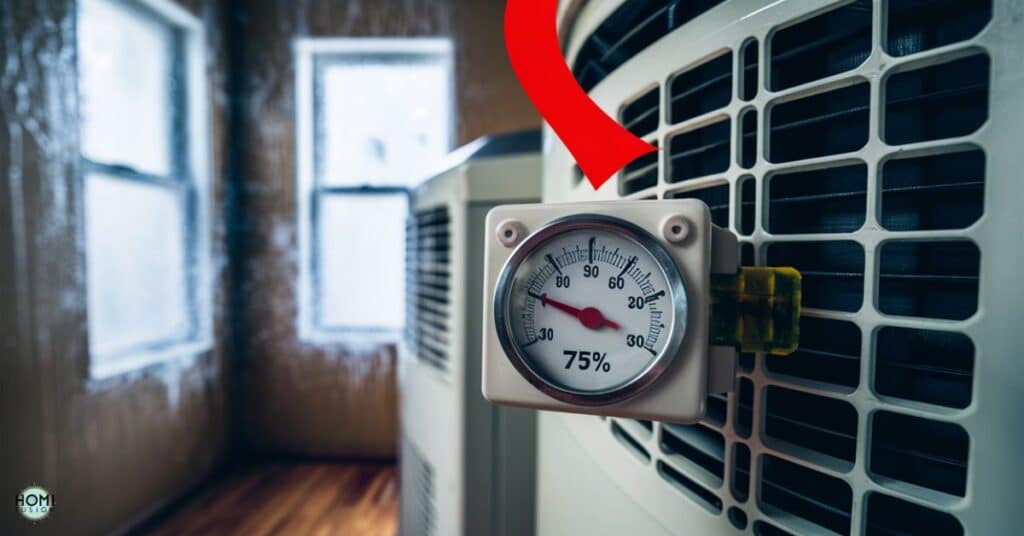
Poorly maintained HVAC systems can also lead to moisture problems such as clogged filters or malfunctioning components. Regular maintenance and proper sizing of your HVAC system can help ensure it effectively controls humidity levels in your home. If you suspect issues consider consulting with an HVAC professional to assess and address any problems.
The Advantages of Having Optimal Levels Of Humidity
Here are some advantages of maintaining optimal levels of humidity:
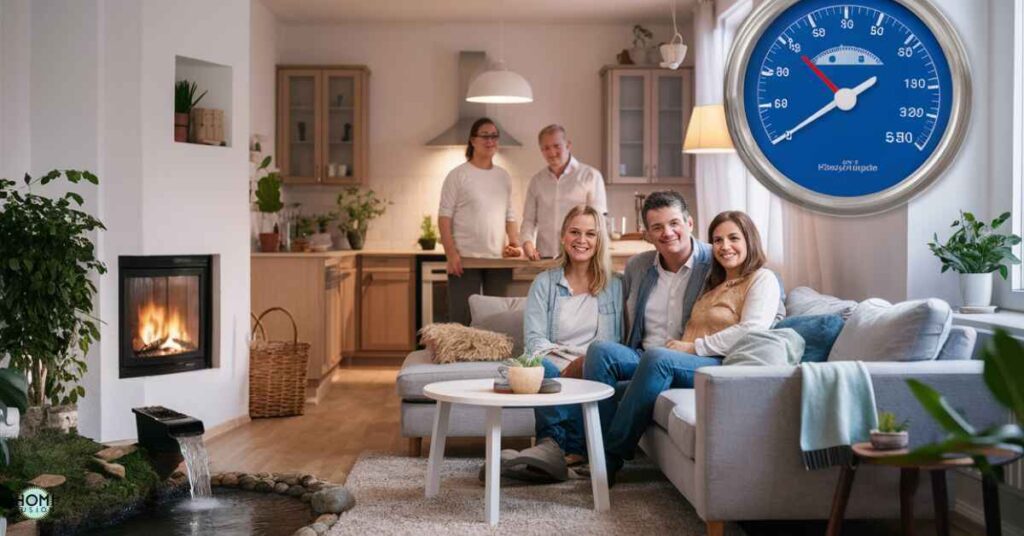
- Respiratory Health: Optimal humidity levels can help reduce respiratory issues by keeping the airways moist without being excessively humid, benefiting individuals with conditions like asthma and allergies.
- Comfortable Indoor Environment: Maintaining optimal humidity levels creates a comfortable indoor environment, preventing the air from feeling too dry or too damp.
- Preservation of Property: Optimal humidity levels help preserve wooden furniture, musical instruments, and electronics by preventing warping, cracking, or moisture-related damage.
- Energy Efficiency: Proper humidity levels can improve energy efficiency as the air feels more comfortable at optimal humidity, reducing the need for excessive heating or cooling.
- Improved Sleep Quality: Balanced humidity levels contribute to better sleep quality, as the air is neither too dry nor too humid, promoting a more restful sleep.
- Reduced Allergens: Maintaining optimal humidity levels can reduce the presence of allergens like dust mites and mold, leading to improved indoor air quality and fewer allergy symptoms.
- Skin and Hair Health: Balanced humidity helps keep skin and hair hydrated, reducing dryness, itching, and flakiness, especially during dry seasons.
- Extended Food Shelf Life: Optimal humidity levels in food storage areas can help extend the shelf life of perishable items by reducing moisture loss or mold growth.
- Less Static Electricity: Balanced humidity levels can reduce static electricity, preventing annoying shocks and potential damage to electronic devices.
- Improved Productivity: A comfortable and well-regulated indoor environment with optimal humidity levels can boost productivity and concentration levels in work or study settings
Frequently Asked Questions
How do you get rid of humidity in your house?
To reduce humidity in your house use dehumidifiers and air conditioners, especially in hot and humid climates. Additionally, ensure proper insulation and ventilation to prevent moisture buildup and condensation.
Why is my house so humid even with air conditioning?
If your house feels humid with air conditioning it might be due to an oversized unit those cycles too frequently failing to dehumidify effectively. Ensure your AC is correctly sized for better humidity control.
Is it good to have a humid house?
No, high humidity in a house can cause mold mildew and damage to surfaces. Keeping humidity levels below 60% is ideal to prevent these issues.
Can my AC cause high humidity?
Yes, an oversized or improperly functioning air conditioner can cause high humidity by not effectively dehumidifying the air. It may cycle on and off too frequently preventing proper moisture removal.
Conclusion
Excess humidity in your house can result from various factors like inadequate ventilation oversized air conditioning units climate conditions and building materials. When moisture accumulates indoors without proper ventilation it leads to high humidity levels. Additionally, regions with naturally high outdoor humidity can transfer moisture indoors affecting indoor humidity levels. Understanding these factors is crucial for identifying and addressing the root causes of high humidity in your home.
To combat high humidity consider improving ventilation, sizing your air conditioning unit correctly and addressing any moisture seepage or plumbing leaks promptly. These steps can help maintain optimal humidity levels indoors ensuring a more comfortable and healthier living environment. Proper humidity control not only enhances comfort but also helps protect your home from potential damage caused by excessive moisture. By taking these measures you can effectively manage and reduce humidity levels in your house, promoting a more pleasant indoor atmosphere.

